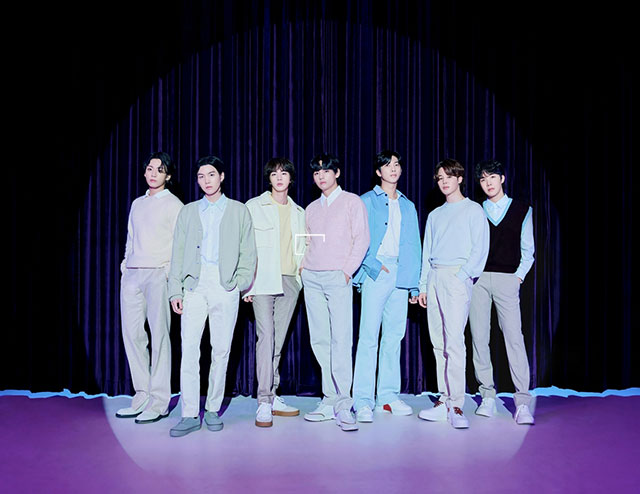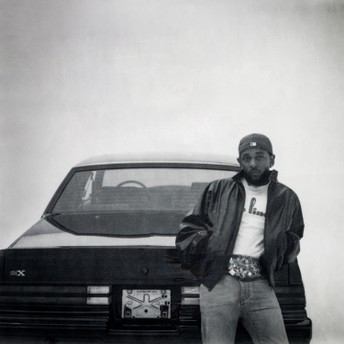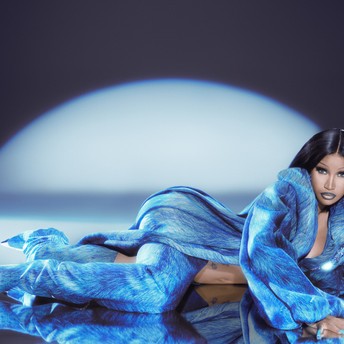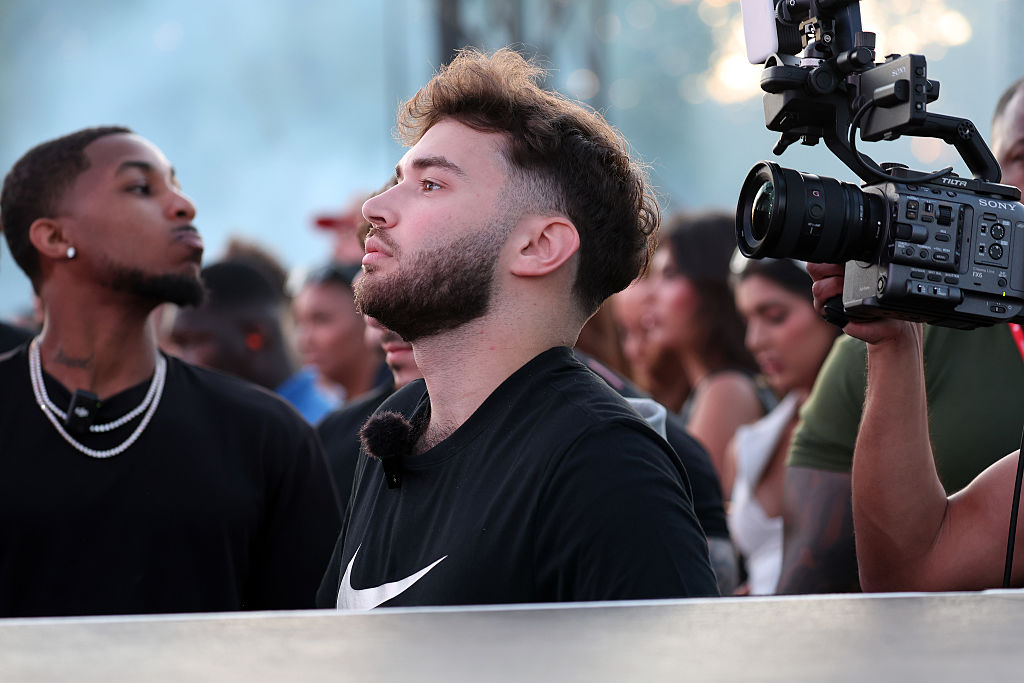News
Page: 184
Trending on Billboard
Billboard turned its attention to the biggest titans in the Latin music space during our Latin Power Players 2025 event, hosted by Johnnie Walker, and the support throughout the celebration was strong.
Explore
See latest videos, charts and news
On Monday, October 20, some of this year’s most influential names in the business gathered at Casadonna Miami for specialty cocktails, mingling, and tributes to this year’s honorees as part of Billboard Latin Music Week. After taking photos on the carpet, attendees were treated to mini Carajillos made with Johnnie Walker Black Label as they entered the celebration. With the Miami waterfront as its backdrop, music filled the venue as industry leaders networked, nibbled on appetizers, and posed for photos in front of a flower wall provided by Johnnie Walker. Additional Johnnie Walker cocktails included a Bad Johnnie served in a branded coconut, as well as full glasses of Carajillo.
Hannah Karp, Editorial Director, and Leila Cobo, Chief Content Officer of Latin/Español, kicked off the honors of the night, sharing a few brief words with the crowd. Double P Records co-founders Peso Pluma and George Prajin took home the Top Regional Mexican Albums Label of the Year award, while the Regional Mexican Airplay Label of the Year was awarded to Universal Music Latin Entertainment, presented by Ela Taubert to Angel Kaminsky and Ana Martínez. Meanwhile, the Top Latin Rhythm Albums Label of the Year and Hot Latin Songs Label of the Year awards went to Rimas.
Later in the evening, all eyes were on Nir Seroussi, head of Interscope Capitol Miami, who received the Latin Power Players Executive of the Year award. And it was none other than J Balvin, Xavii, and John Janick, CEO of Interscope, who took to the stage to show him love ahead of his acceptance speech.
Scroll below to relive all the highlights from the evening, including the custom cocktails, honoree speeches, and more!
Trending on Billboard
It ain’t over yet: Drake has formally launched his appeal of a court ruling that dismissed his defamation lawsuit against Universal Music Group (UMG) over Kendrick Lamar’s diss track “Not Like Us.”
The move on Wednesday is the first step aimed at reversing that ruling, in which a federal judge ruled earlier this month that Drake could not sue over Kendrick’s lyrics that called him a “certified pedophile.” The star’s lawyers, who say millions of fans took that claim literally, had already vowed to appeal the decision.
Related
It could take well over a year for the appeals court to rule on Drake’s case, prolonging a messy legal drama that has captivated the music industry and, at times, drawn ridicule in the hip-hop world. If the appeals court sides with Drake, it could mean years more litigation after that.
In his new court filing, Drake formally stated his intention to appeal, but did not include any detailed arguments on how he will do so. Such arguments are made in later briefs at the appeals court, where lawyers for both sides will eventually make their case.
A rep for Drake told Billboard on Wednesday: “This confirms our intent to appeal, and we look forward to the Court of Appeals reviewing that filing in the coming weeks.” A spokesman for UMG did not immediately return a request for comment.
Lamar released “Not Like Us” in May 2024 amid a war of words with Drake that saw the two UMG stars release a series of bruising diss tracks. The song, a knockout punch that blasted Drake as a “certified pedophile” over an infectious beat, became a chart-topping hit in its own right and won five Grammy Awards, including record and song of the year.
In January, Drake took UMG to court over the song, claiming his own label had defamed him by boosting its popularity. The lawsuit, which didn’t name Lamar himself as a defendant, alleged that UMG “waged a campaign” against its own artist to spread a “malicious narrative” about pedophilia that it knew to be false.
Related
Those claims stunned the music industry. Few expected a rapper to respond to a diss track with a lawsuit — a move that drew hackles in the hip-hop world and condemnation from legal scholars. Fewer still expected him to file it against UMG, his longtime record label and the biggest music company in the world.
Just 10 months after Drake filed it, Judge Jeannette Vargas dismissed the case. She said Kendrick’s insulting lyrics were the kind of “hyperbole” that cannot be defamatory because listeners would not think they were statements of fact. She said fans didn’t expect to hear “accurate factual reporting” from a a diss track “replete with profanity, trash-talking, threats of violence, and figurative and hyperbolic language.”
“The artists’ seven-track rap battle was a ‘war of words’ that was the subject of substantial media scrutiny and online discourse,” the judge wrote. “Although the accusation that plaintiff is a pedophile is certainly a serious one, the broader context of a heated rap battle, with incendiary language and offensive accusations hurled by both participants, would not incline the reasonable listener to believe that ‘Not Like Us’ imparts verifiable facts about plaintiff.”

Trending on Billboard
Nowadays, BTS is the biggest boy band on the planet, K-pop or otherwise. But not too long ago, the genre was seen as niche in the Western world, a mindset that group leader RM credits ARMY with changing.
At this year’s APEC CEO Summit in South Korea — which gathers some of the most influential executives and economic leaders across Asia to discuss the future of business and innovation — RM delivered the keynote address and called on those in power to invest in artistic endeavors. “I’m not sure how familiar you are with K-culture or K-pop,” he told the crowd in Gyeongju-si on Wednesday (Oct. 29).
“But I’m sure you all agree that the cultural industry has great economic value and growth potential,” the performer continued. “As a creator and an artist of this generation, I would like to use this opportunity to make a request … there are creators all around the world. Please help them. Give them the financial support so that their own creativity can bloom. Give them the opportunities so that their talents can really shine.”
The global star emphasized how when BTS started, the group was called a “foreign culture” and that their music felt like a test to see if K-pop could enter the “global stage.” People didn’t ask about their music, he added, but instead, wondered whether the group was from North or South Korea.
“But we overcame those barriers, and now I’m here today sharing this precious moment with you.ARMY was the force that broke down those barriers,” he declared. “They use our music as the medium to carry out conversations that cross borders and languages. They were inspired by the message in the music of BTS to give to charity, to run social campaigns. And finally, the world was amazed. Back then ARMY was seen as ‘supporters of a minority culture from Asia.’ Now, they shake the world as a new community and a fandom culture.”
Elsewhere in his speech, RM emphasized how fortunate he feels to have his fans and bandmates Jin, SUGA, j-hope, Jimin, V and Jung Kook in his life. “I’m a very lucky person,” he gushed. I’m lucky to have met the six other members of BTS … And most importantly, I’m lucky I met ARMY, who accept our music not just as a diversion, but as our shared language of life.”
According to a release, this year’s summit marked the first time cultural and creative industries have been treated as key agenda items by APEC. In a world where the arts are undervalued all too often, RM drew on his own success as part of BTS to show the investors at the event how lucrative it can be to back music and other artistic endeavors.
RM’s appearance at the event comes as BTS is gearing up to make a major comeback in 2026. After spending some time apart to fulfill their respective service requirements in the South Korean military — during which time many of the members dropped solo projects, with RM dropping his album Right Place, Wrong Person in May 2024 — the band reunited this past July and promised that a new full-length and tour were in the works.
The following month, RM shared his thoughts on the comeback in a letter to ARMY on Weverse. “Making something ‘together’ with these friends,” he wrote of his bandmates at the time. “I’m going to commit myself to this moment. I’m going to thank you … I’m looking for what I’ll become. Something I’ve forgotten for too long.”
Read RM’s full speech at the 2025 APEC CEO Summit below.
Hello. I’m RM, the leader of BTS.
It’s an honor to be here and to meet the leaders of APEC here in Korea, where I was born and raised. I’m honored to tell you about myself, and to share my message. I’m proud and excited that this year, for the first time, the “cultural industry” was chosen as a key agenda for APEC.
I’m not sure how familiar you are with K-culture or K-pop. But I’m sure you all agree that the cultural industry has great economic value and growth potential. But I’m just an artist. I’m not a business leader. I don’t think you want to hear any numbers or figures from me.
So, today I want to speak to you as a creator and an artist. I want to share my thoughts on how K-pop crossed borders to move the hearts of people. It’s not something we can calculate or measure. It’s a bridge that connects worlds, and I want to bring your attention to how we can work together to build this connection for tomorrow’s creative cultural ecosystem.
I’m a very lucky person. I’m lucky to have met the six other members of BTS. I’m lucky that I met our producer “Hitman” Bang, who gave us his full support that we could make the music we love. And most importantly, I’m lucky I met ARMY, who accept our music not just as a diversion, but as our shared language of life.
Oh, by the way, ARMY is the name of the official BTS fandom. Further information, the army is where I just finished my military service. I was there for 18 months. Just wanted to make sure.
ARMY’s support and passion crossed all borders and opened up brand new paths for me. They gave me a voice that was heard at the Billboard Music Awards, at the Grammys, at the United Nations and even at the White House. At such historic and symbolic events, like right here at the APEC.
BTS first started to go outside Korea about 10 years ago. Back then, we didn’t dream of what we see today. Nothing was like this. Did you ever turn on your TV or radio and hear a song that’s not in your language or English? Probably not very often. I felt how hard it is to ever hear a Korean song in an English-speaking country. I saw how high a cultural barrier could be.
At that time, the music of BTS was quickly called “non-English, foreign culture.” Trying to get on mainstream media through our music was like doing an experiment and a huge challenge. It was a test to see if “music in Korean can work on the global stage.” We tried to get on TV to show the world our music, but the doors were closed and would not move.
But, as you know, we couldn’t just sit around and wait. We tried to make our own opportunities. we danced in the streets. We handed out flyers to free shows. But there was something even more difficult than those. When we said, “We are artists from Korea.” They didn’t ask us about our music. They asked, “Are you from North Korea or South Korea?” “Where on Earth is Korea?” So, we had to explain where Korea was before we could even talk about music. And that was reality.
But we overcame those barriers, and now I’m here today sharing this precious moment with you. ARMY was the force that broke down those barriers. They use our music as the medium to carry out conversations that cross borders and languages. They were inspired by the message in the music of BTS to give to charity, to run social campaigns. And finally, the world was amazed. Back then, ARMY was seen as “supporters of a minority culture from Asia.” Now, they shake the world as a new community and a fandom culture.
Even at this very moment, they are crossing borders and breaking down barriers through the pure power of cultural solidarity. Solidarity and tolerance that know no borders. And it’s an endless source of creative inspiration for me as well.
There is so much cultural content around the whole world. But why K-pop? Why is it so unique? Why does K-pop create this powerful and inclusive community?
It’s because of the special principle of unity of K-pop. This is what enables people from such diverse backgrounds to come together, just through the medium of K-pop.
I like to compare K-Pop music to bibimbap. Bibimbap is a traditional Korean dish. You have to taste it. You take “bap,” which is rice. Then you put all kinds of vegetables, meat and flavorings on top, and mix it all up. That’s the “bibim.”
K-pop is much the same. You take Korea’s unique aesthetics, emotions and production system. But you don’t turn away elements of Western music, like hip-hop, R&B and EDM. Just like bibimbap, these parts all keep their unique identities but mix together to make something new and fresh and delightful. K-pop is not just a genre of music. It’s a 360-degree, total package of music, dance, performance, visual style, story-telling, music video and even social media.
K-pop’s success didn’t happen because one single culture was better. K-pop’s success came from respecting diversity and embracing world cultures, but still holding onto Korea’s unique identity. When cultural barriers come down and different voices harmonize together, there’s an explosion of creative energy. This is where ARMY’s borderless solidarity came from. And this is why K-pop is loved everywhere.
Culture is like a river. It flows freely, different streams sometimes coming together in harmony, just like K-pop. Coming together to carry itself far away and create something new. I would like to see this creative flow of culture happen everywhere around the world. The Asia-Pacific region has incredible dynamic cultural diversity. K-pop’s shining success is proof that cultural diversity and creativity are the greatest human potential — a force with no borders, no limit to growth.
Ladies and gentlemen, leaders of APEC, let me ask you a question: What is your favorite song? Do you remember seeing a painting that took your breath away? A book you read over and over again? We all know, we all love culture and art. And we are connected by the emotion and resonance that they awaken in us.
As a creator and an artist of this generation, I would like to use this opportunity to make a request to the leaders and distinguished guests of APEC. There are creators all around the world. Please help them. Give them the financial support so that their own creativity can bloom. Give them the opportunities so that their talents can really shine. When you think about investing in tomorrow’s generations, think about culture as well as economics. Culture and art are a powerful force that moves hearts. They are the fastest messengers that carry diversity and resonance.
As the leaders of APEC, your policies and support will be the canvas and playground for all the creators. The foundation for creators all over the world to pour out their creativity. When creators flourish, other elements of culture gather to form some brand new aesthetics. Their content will go beyond all kinds of “differences.” They will blaze a road of true understanding and tolerance. They will create the power of solidarity for the future.
I, too, stand by the vision of APEC. A vision that will drive diversity, inclusion and growth through culture and creativity. As an artist, I promise that I will also let my imagination fill the canvas you will create. I will play my heart out in the playground you will build for us. I promise that I’ll do my part by sending a message of courage and hope and a lot of emotions through music. A message of embracing our differences to make something better together.
I would like to ask for your support for this future. I believe you can make this happen. Your support can make creators let their creativity soar. With your help, their creations will resonate around the whole world.
Thank you.
Want to see everything that BTS has said about its upcoming reunion? Click on the image below!
BTS
Trending on Billboard
With Kendrick Lamar and SZA’s 13-week Billboard Hot 100 No. 1 “Luther” falling off the Hot 100 dated Oct. 25, 2025, there were officially no rap songs in the chart’s top 40 last week.
Explore
See latest videos, charts and news
The highest-ranking rap song — defined as a song deemed eligible for charting on Billboard’s Hot Rap Songs listing — on the Oct. 25 Hot 100 was YoungBoy Never Broke Again’s “Shot Callin,” at No. 44. Cardi B’s “Safe” (featuring Kehlani) and BigXthaPlug’s “Hell at Night” (featuring Ella Langley) also ranked in the 40s, at Nos. 48 and 49, respectively.
The last time before that when there were zero rap songs in the top 40 of the Hot 100? You have to go back all the way back to Feb. 2, 1990, when the top-ranking rap song was Biz Markie’s eventual top 10 hit “Just a Friend,” which had just climbed to No. 41 on the chart. The next week, “Just a Friend” jumped to 29, starting a Hot 100 streak of rap songs in the top 40 that would last for the next 35 years, eight months and three weeks.
Recent rule changes to Billboard’s Hot 100 methodology did play a part in the streak coming to an end. For the chart dated Oct. 25, descending songs were deemed recurrent and removed from the chart if they had exceeded certain durations on the chart while also falling below certain updated chart thresholds — for instance, if they had fallen below No. 25 after spending over 26 weeks on the chart. That particular change resulted in the departure of “Luther,” which had fallen to No. 38 on the previous week’s Hot 100 in its 46th week on the listing.
However, with “Luther” and seven other songs in the Hot 100’s top 40 going recurrent on the Oct. 25 chart following the rule change, there was also extra opportunity for songs below them on the chart to rebound into the top 40, or to reach it for the first time. No rap songs were close enough to the threshold to be able to make that jump. (Also in the way: all 12 songs from Taylor Swift’s new album, The Life of a Showgirl, have been lodged in the top 40 the past three weeks, further limiting room for rap hits in the region.)
The lack of rap songs in the Hot 100’s top 40 is the latest sign of a recent dip in rap’s commercial dominance. Hip-hop’s overall market share reached a peak in 2020, when it neared 30%. That had slipped to just over 25% in 2023, and has been at 24% so far in 2025, through the week of Oct. 23. In the Hot 100 chart for the equivalent chart week five years ago (dated Oct. 24, 2020), a whopping 16 of the top 40 were rap songs, while in the equivalent chart two years ago (Oct. 28, 2023) there were eight rap songs in the top 40.
It is worth noting that the rap world is currently in a bit of an in-between moment with some of its biggest names. Drake, the biggest chart mainstay of the past 15 years (and the artist with the most Hot 100 hits of all time), has not yet released his much-anticipated Iceman album, while his 2024 foe Lamar is finally somewhat dormant following an 18-month period of cultural and commercial domination. However, the last few months have not been totally without big rap releases: both Cardi B and BigXthaPlug (two of the rappers currently closest to the top 40) have released new albums since August, and even without a new album, Drake has released a steady stream of new singles since announcing the album in July.
“Luther” is also the most recent rap song to appear in the Hot 100’s top 10, last doing so on the chart dated Aug. 2, when it ranked at No. 9, before falling to No. 12 the next week. In the two months and three weeks following that chart, the closest another rap song got to the Hot 100’s top 10 was BigXthaPlug’s “All the Way” (featuring Bailey Zimmerman), which ranked at No. 22 for the Hot 100 dated Sept. 6, after peaking at No. 4 in April.
On this week’s Hot 100 (dated Nov. 1, 2025), the rap song-less streak is extended to a second week, as once again no rap songs rate in the chart’s top 40. However, “Shot Callin” does get one spot closer to ending the drought by breaking into the region, climbing No. 44-43 this week.
Additional reporting by Dan Rys.
Trending on Billboard
Coi Leray is clearing the air after Cardi B name-dropped her on Am I the Drama?‘s “Pretty & Petty.”
Coi joined the Bootleg Kev Podcast on Tuesday (Oct. 28), where she explained her reaction to Cardi referencing her in a bar on the bristling track. “They only hit you when they can’t afford Coi,” Cardi seemingly snipes at BIA on the song.
The “Players” rapper showed plenty of love to Cardi, calling the Bronx native “amazing” and saying that she respects Cardi “all the time.”
Explore
See latest videos, charts and news
“I don’t think it was a diss,” she said, which Bootleg Kev agreed with. “I mean, I don’t got nothing to do with anything else, but as far as me, you know, I don’t think it was a diss at all.”
Coi continued: “I f—k with Cardi. Me and Cardi, we got each other real information. Like we speak offline, we real people before we industry.”
Leray detailed how she has an open line of communication with Cardi, as she’ll text her randomly to show love or get advice about things such as real estate. “I hit her all the time. I’ll hit her and be like, ‘Love you,’” she said. “Or sometimes, like, when I’m moving to Jersey, I’m like, ‘Yo, I need a realtor. You got a realtor for me?’”
The 28-year-old previously debunked rumors that she was upset or annoyed at Cardi name-dropping her on “Pretty & Petty.” “I never said anything about anything. They literally made this s—t up. Get a life,” she wrote on Instagram. “Cardi whole album fire.”
It’s been a busy year for Coi Leray as well, as she became a mom earlier in 2025. On the music side, she teamed up with Shoreline Mafia for her “Act Like You Know” single in October.
Watch the interview with Coi below. Talk about Cardi B’s “Pretty & Petty” takes place just shy of the 24-minute mark.
Source: LULULEMON / LULULEMON
Football merch is getting an upgrade. The National Football League has struck a deal with Lululemon for a new collaboration.
As spotted on Variety, Lululemon is expanding its portfolio beyond the athletic apparel space. This week, the Vancouver, Canada-based label announced a partnership with the NFL. The move is significant for Lululemon, as this is their first-ever licensed merch collection. The drop includes all 32 teams, with pieces for both men and women. Included are some of Lulu’s signature styles, including the Women’s Scuba hooded sweatshirt and the Men’s Steady State crewneck. Developed in conjunction with Fanatics, the “Welcome to the Fam Club” campaign tapped some of the sport’s most influential personalities. Serving as the faces for the launch are the likes of Joe Montana, Ryan Clark, Emmanuel Acho, and more.
Lululemon senior leadership detailed why the collaboration made so much sense in a press statement. “True NFL fans wear their pride. For them, fan gear is more than apparel, it’s a badge of loyalty and a way to instantly connect with a community that is like a family,” said Celeste Burgoyne, President, Americas and Global Guest Innovation, at Lululemon. “We looked to honor that passionate devotion and are thrilled to be part of that ritual found throughout the NFL season.”
The National Football League was as equally excited to offer elevated team merch all backed by Lululemon’s commitment to quality. “Together with Fanatics, we are introducing an elevated collection that redefines modern fan apparel and is uniquely designed for everyday comfort,” said Renie Anderson, Executive Vice President and Chief Revenue Officer, at the NFL. “Lululemon boasts a loyal fan base built on culture, meaningful connections and innovation, qualities that thoroughly reflect the NFL.”
The collection is live — cop your team’s elevated fan gear now.
Source: Simone Joyner / Getty
It’s no secret that Drake and Adin Ross are down bad these days due to their own personal life decisions as of late, respectfully. But now it seems like things may get a bit worse, as both men are facing some pretty serious accusations in a new lawsuit.
According to Complex, a Missouri man, Justin Killham, has just filed a lawsuit against the Canadian crooner and popular streamer alleging that the two have been promoting Stake’s parent company Sweepstakes Limited’s online gambling. The suit says it’s illegal and goes against Missouri’s state gaming and consumer protection laws. Stating that Stake has engaged in “deceptive trade practices” by using said celebrities in promoting their gambling website, Killham feels that they’ve exploited “vulnerable” Missourians who’ve fallen prey to their marketing and promotion methods and developed gambling addictions as a result.
Per Complex:
“Stake in particular pays online influencer-defendants Adin Ross and Aubrey Drake Graham each millions of dollars yearly to engage in promotion ‘livestream online casino gambling with Stake.com,” the lawsuit reads, accusing Ross and Drake of claiming they gamble with their own money and don’t disclose they’re using Stake-provided funds.
Love News? Get more! Join the Hip-Hop Wired Newsletter
We care about your data. See our privacy policy.
“These acts are deceptive, fraudulent and unfair and violate Missouri law,” the suit adds. “Drake and Ross deceptively and fraudulently misrepresent, as does Stake itself, that Stake is a social casino and not a real one in their promotional role for Stake, and they also fraudulently and deceptively misrepresent that they only gamble with their own money on Stake.”
Killham is seeking “recovery of gambling losses” on behalf of himself and others impacted by Stake, Drake, and Ross.
While many people wouldn’t fall for anything that Drake or Adin Ross would promote these days, Killham himself seems to have taken the bait and now wants restitution for his own poor life choice (no shots). Still, it seems like he has a pretty strong case, as he seeks to have someone held accountable for the losses he might’ve suffered at the hands of Stake.
More from Complex:
“To hide the true nature of its online gambling operation, Stake asserts that the only chips it sells to consumers are tokens called ‘Gold Coins,’ which can only be used for ‘casual’ gameplay on the Stake.us platform, have no real-world value, and can never be cashed out,” the lawsuit reads. “However, Stake bundles every purchase of Gold Coins with a second type of token called ‘Stake Cash’ as a supposedly free bonus. Unlike Gold Coins, Stake Cash can be wagered on casino games and cashed out for real money at a fixed 1:1 ratio to the U.S. Dollar – exposing Stake Cash as a clear vehicle for real-money gambling.”
The lawsuit argues that Stake Cash, which can be wagered on games over the internet and redeemed for real money, allows the company to get away with “operating an unlicensed and illegal online casino in Missouri.”
Naturally, a spokesperson for Stake has denied the allegations saying, “We reject allegations that have been made in the media in relation to this potential claim and will vigorously defend this and all such claims,” and says they have yet to be served any official complaint thus far.
Should be interesting to see how this one shakes out.
What do y’all think about this lawsuit against Drake and Adin Ross? Let us know in the comments section below.

Trending on Billboard
Nobody is saying there is a direct connection, but it sure seems like whenever Brad Paisley performs the national anthem before a World Series game things tend to go long. The “When I Get Where I’m Going” singer sang the “Star-Spangled Banner” at Dodger Stadium on Monday (Oct. 27) in game three of the World Series between the Los Angeles Dodgers and the Toronto Blue Jays, there was no way to know that the contest would stretch into a record-tying 18 innings over more than six-and-a-half hours, with the Dodgers ending up with a 6-5 victory.
Explore
See latest videos, charts and news
Well, unless you’ve been paying attention and clocked that it was the fourth time Paisley had done the honors, with each one of those games going into extra innings: 11 innings for game 2 in 2017, 18 innings for game 3 in 2018 and 10 innings in game one in 2024.
Speaking to the Associated Press on Tuesday (Oct. 28), Paisley revealed whether, given his track record, he suspected Monday’s game would go long. “No, I fully, I fully expected this to actually be over in nine for maybe the first time in a while, you know,” he said, adding, “I am cursed. No, I don’t think so. … It’s wild. It’s fun. I think it’s a really fun thing.”
Paisley said that actually, instead of being a curse, he considers his extra inning run as one of those “weird fun facts that baseball excels in… It’s what Brad Pitt says in Moneyball. It’s like, ‘How can you not be romantic about baseball?’”
In fact, Paisley is so into his unique status as baseball’s extra inning man that he’s given himself a new nickname: “Mr. More Baseball.”
“It’s kind of cool to know that I sang the anthem at a couple, at the two of the four total Dodger walk-off games that ever happened. The other two were before my time anyway. … And especially the one that was 18 innings,” Paisley said, noting that around the 16th inning on Monday he thought, “‘There’s no way this is happening again.’” The day after, the singer said he saw a couple of statisticians note that he’s never performed at a World Series game that didn’t go into extra innings. “I’m available for football games, too,” he joked. “If anybody wants, you know, another quarter or two out of their team.”
Though Paisley is a West Virginia native, he said marrying wife actress Kimberly-Williams Paisley in 2003 and having a home in the Los Angeles area has made him a de facto Dodgers die-hard. “I would take the kids to these games. I got to know so many people there. … It was just an easy transition into that. I grew up going to Pirates games. My dad liked the Indians,” he said of his other go-to teams.
He noted that he’s also become friendly with a few Dodgers players, including pitcher Clayton Kershaw and infielder Justin Turner, as well as team manager Dave Roberts. “We’ve had adventures together,” Paisley said. “It’s a slow progress to where you’re addicted to something. And I got there pretty quick a while back.”
Trending on Billboard The Latin Recording Academy announced on Wednesday (Oct. 29) that Maluma and Roselyn Sánchez will host the 26th Annual Latin Grammy Awards. The Colombian hitmaker will make his hosting debut. Meanwhile, Sánchez returns for the eighth time as host of the Latin Grammys, including her most recent stint in 2023. The Latin Grammys will air […]
All products and services featured are independently chosen by editors. However, Billboard may receive a commission on orders placed through its retail links, and the retailer may receive certain auditable data for accounting purposes.
Trending on Billboard
With Halloween just around the corner, it’s time to start thinking about what you’ll be dressing your little ones as.
The obvious choice? Characters from KPop Demon Hunters, of course. The movie has taken over mainstream media, becoming a viral sensation across the globe with no end in sight. You’re bound to see a bunch of Rumis and Jinus running around this spooky season. Why not get ahead of the game and shop official Netflix costumes now from Spirit Halloween?
Ditip Pop Hunters Singers Demon Costume Outfits Halloween Cosplay Dress (A, 150/11-12 Years)
$24.99
$29.99
17% off
A costume for 11 to 12 year olds.
C-ZOFEK Dance Group Anime Cosplay Costume Performance Outfits Halloween Party Women (Medium)
A KPop Demon Hunters costume.
The retailer just added a few KPop Demon Hunters costumes to its inventory, and they’re pretty cute. The best part? None of them are more than $30. You’ve got costumes for every HUNTR/X member, from fearless vocalist Rumi and the group’s dancer Mira to rapper Zoey. Kids’ sizing on these costumes ranges from three to four years up to 13 to 14 years, giving everyone ample opportunity to dress like their demon-hunting favorites.
Explore
See latest videos, charts and news
Each costume is very accurate to the film, down to the zippers, to help make your little one feel as if they just stepped out of the film. The costumes come with a top and bottom, and are made of soft milk silk, a breathable fabric that doesn’t irritate the skin. Purple hair and space buns are not included. Footwear is not included with the costumes, which means you’ll just have to get creative.
Netflix’s animated film dropped back in June, focusing on the popular phenom that is K-pop. The film follows fictional world-renowned K-pop girl group HUNTR/X, which consists of members Rumi, Mira and Zoey. The group sings and performs, while secretly slaying demons when not on stage. The movie has since spawned everything from coloring books to Funko figures that have sold like hotcakes. The animation is vibrant, while the dialogue and accompanying songs are both funny and touching.
Long Purple Braiding Hair Pre stretched Synthetic Hair Extensions for Braids
$18.58
$23.59
21% off
Purple hair extensions for Rumi’s braid.
Morvally 39 Inches Long Red Wig with 2 Ponytails for Women – Anime Cosplay Wigs for Womens Halloween Costume Party (Red, Adults)
$27.99
$29.99
7% off
A wig inspired by Mira from KPop Demon Hunters.
Many real-life K-pop acts are featured throughout the film. Andrew Choi, who is the singing voice of Saja Boys’ Jinu, is currently an active solo artist under SM Entertainment. Hit K-pop girl group TWICE performs the version of HUNTR/X’s “Takedown” that appears during the credits. Kevin Woo, who provided the singing voice for Saja Boys’ Mystery Saja, is from the K-pop boy band U-KISS. It’s clear that the producers of the film had an appreciation for the music genre and current artists.
Purple Temporary Tattoo Stickers – 4 PCS Purple Tattoos and 4PCS UV Fluorescent (Under Altraviolet Lamps)
$19.99
$23.99
17% off
Temporary tattoos inspired by Rumi’s markings from KPop Demon Hunters.

 State Champ Radio
State Champ Radio 







